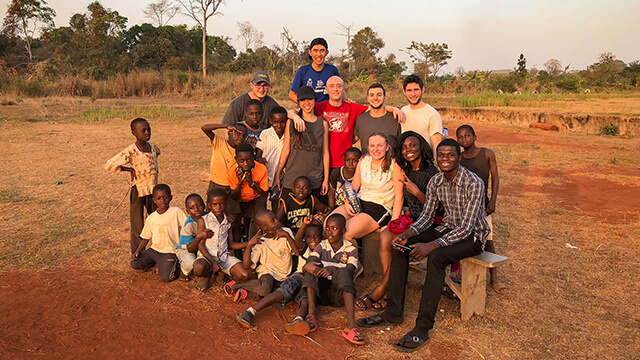- October 04, 2018
- By Anjanette Riley
The 20 undergraduates spending a Wednesday evening in a second-floor classroom of the J.M. Patterson Building study on a campus that increasingly derives its electricity from renewable energy, and now they’re planning a way to help students halfway around the world take greater advantage of the sun’s limitless resources.
In January, members of the university’s chapter of Engineers Without Borders (EWB-UMD) will travel to Suma Ahenkro, Ghana to install a solar electric system at Sumaman Senior High School. It will be the second such system installed after it first partnered with the school in 2014.
“The school experienced a lot of blackouts when it was completely on the grid,” said Quinn Wandalowski, a mechanical engineering sophomore and the 2018–19 Ghana program lead. “The reliability of solar power systems make it easier for students to study.”

She and her team have worked closely with Sumaman administrators and the nonprofit organization Changing Lives Together, carefully balancing community needs, system costs, material access and more to ensure that the final product will operate effectively for years to come.
“Crafting a project with the community from the beginning is less common than you would think,” said EWB-UMD President Nipun Kottage, an anthropology senior who also leads Maryland Sustainability Engineering (MDSE), a group dedicated to improving sustainability locally and around the world. “It’s difficult, too, because people aren’t always sure what they need, or you may need to work on something else before you are able to actually tackle what they’d like to see happen.”
EWB-UMD and MDSE typically spend years working with the same community on a number of related projects. Each begins with what the groups call an assessment trip to the community during summer or winter break to talk with local officials and stakeholders about their needs. That list is carried back to College Park, where EWB-UMD and MDSE’s 132 members work on community-specific teams.
In addition to Suma Ahenkro, Ghana, EWB-UMD also has ongoing programs in Compone, Peru, El Cacao, Nicaragua and Sarsyu, Nepal, while MDSE members are pursuing improvements abroad in Calaba Town, Sierra Leone and in Maryland.
Spending years in a community allows the student groups to build trust. The EWB-UMD program in Peru completed its final build project in August 2018, a roughly 17-foot pedestrian bridge in Compone. The team’s relationships in the community, said team leader and civil engineering major Nicolas Alvarez-Couceiro, meant most residents appreciated EWB-UMD even after the students weren’t able to build a larger vehicle bridge that some had wanted instead.
Perhaps the biggest test of these relationships, though, came in 2014. An Ebola virus epidemic was ravaging West Africa, and MDSE’s Sierra Leone team was forced to halt construction of a second building at the Abigail D. Butscher Primary School. The structure sat unfinished for two years, until it was safe for MDSE members to return. The team since then also installed a solar power system that provides enough electricity to power lights and fans during the day.
Less than a quarter of the two UMD groups’ memberships are majoring in civil engineering, the degree program most associated with global development activities. Team leaders would like to see more students from other majors at their weekly EWB-UMD and MDSE meetings.
“None of us—not even me as a civil engineering student—knew a lot about design, construction or project management when we first joined,” said Alvarez-Couceiro. “These groups are great opportunities to learn and gain hands-on experience while working on projects that have a real impact on the communities we partner with.”
Visit ewb.umd.edu/about/frequently-asked-questions and mdse.umd.edu/get-involved for information on joining.
Topics
Campus & Community